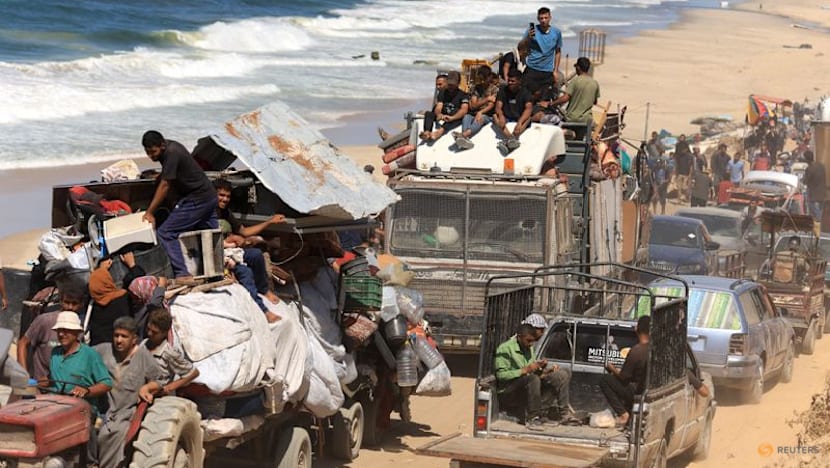Sanctions on Israel unlikely to shift realities on the ground, says Vivian Balakrishnan
Singapore does not enter into sanctions lightly, says Minister for Foreign Affairs Vivian Balakrishnan.

Displaced Palestinians, fleeing northern Gaza due to an Israeli military operation, move southwards after Israeli forces ordered residents of Gaza City to evacuate to the south, in the central Gaza Strip, September 20, 2025. REUTERS/Dawoud Abu Alkas/File Photo

This audio is generated by an AI tool.
SINGAPORE: Sanctions are not something Singapore enters into lightly, and should not be assumed to make a major difference on the ground, Minister for Foreign Affairs Vivian Balakrishnan said on Monday (Sep 22).
The larger point of sanctions is to express Singapore's disapproval, he said in addressing MPs' questions after delivering a ministerial statement on the Israeli-Palestinian conflict.
During his statement, Dr Balakrishnan said that Singapore will impose targeted sanctions on the leaders of radical right-wing settler groups or organisations responsible for acts of violence against Palestinians in the West Bank. Details of this will be announced later.
MPs asked whether Singapore had studied the actions of other countries imposing sanctions and if such measures could advance peace.
MP Saktiandi Supaat (PAP-Bishan Toa Payoh) questioned what thresholds would trigger broader sanctions.
In response, Dr Balakrishnan said historically, sanctions did not make a major difference on the ground.
"It's often more a statement of principle and expression of disapproval. I wouldn't bank that, historically, any set of sanctions has been decisive in its own way," he said.
"I'm not saying that we entered into sanctions lightly. It is, for us, a major statement, but I don't want to overstate its impact."
MP Charlene Chen (PAP-Tampines) asked if tougher sanctions could demonstrate Singapore's objection to the atrocities committed against Palestinians.
"How can the government better communicate the government's approach and that this approach is the best one for Singapore? And when do we impose these sanctions?" she asked.
Dr Balakrishnan said details were being worked out, but underscored that "the larger point behind that is that this is an expression of disapproval".
"This is an expression that is in keeping with our assessment of the situation ... that it is wrong, and it is inimical to the long-term interests of both Palestinians and Israel, and it is a reflection that we continue to believe a two-state solution is the only viable way forward."
MP Nadia Ahmad Samdin (PAP-Ang Mo Kio) similarly asked how the proposed sanctions would "move the needle" on peace.
"Will sanctions from a small city-state like Singapore move the needle on its own? No, it won't. But is it an expression of our views? It is," said Dr Balakrishnan.
"Will the Israelis notice it? I'm sure they will notice it, precisely because they know that we are careful, deliberative, constructive partners who want the best for their long-term survival and for their neighbours, the Palestinians."
MP Xie Yao Quan (PAP-Jurong Central) asked about sanctions in the context of Israel's attack on Hamas leaders in Qatar.
Israel launched an airstrike against Hamas leaders in Doha earlier this month, which Singapore condemned as an "egregious and dangerous" action that violated Qatar's sovereignty.
Mr Xie noted that Singapore had responded to other instances of violation of sovereignty by going beyond verbal condemnation and imposing sanctions.
He asked if the government could consider imposing sanctions in this case to express its disapproval.
Dr Balakrishnan said he was “not inclined” to expand sanctions, noting the risk of having to react to every infraction between countries. "My preference is to reserve it for the most egregious, the most important issues where we need to make a point."
He called for Singaporeans to have a "realistic view" of what Singapore could and could not do.
"My own view is with the Qataris ... We were in contact immediately. They know where we stand. They appreciated (our) stand. But there are some much bigger players who need to resolve the very awkward set of questions that that attack posed."
















